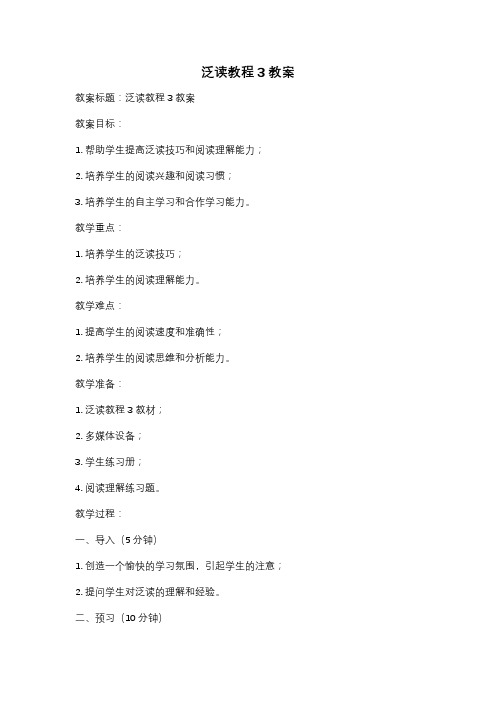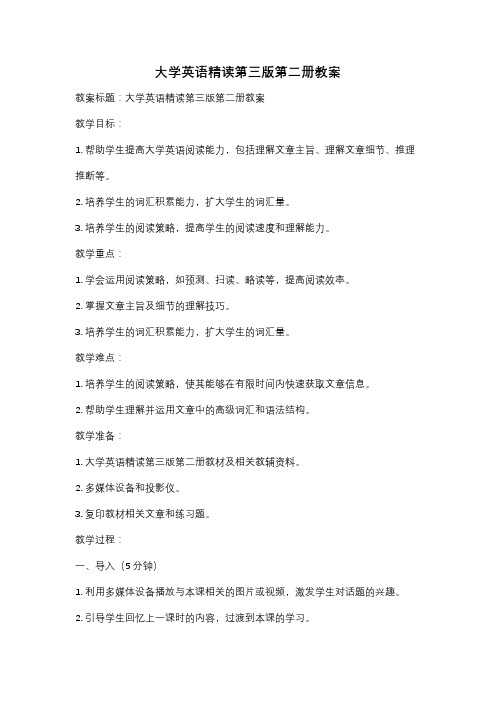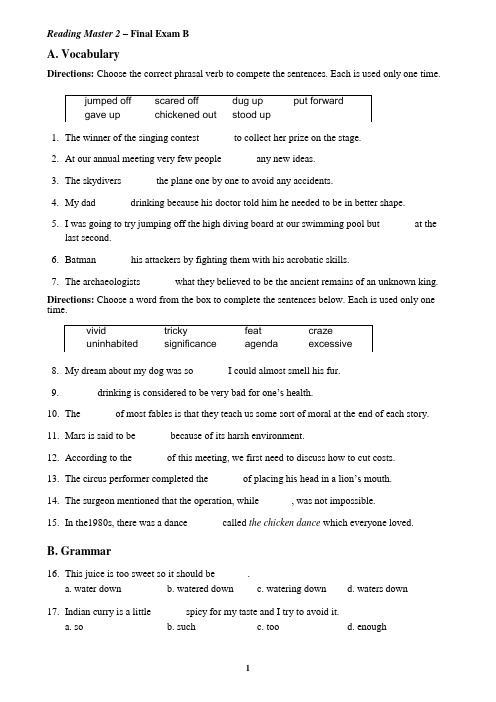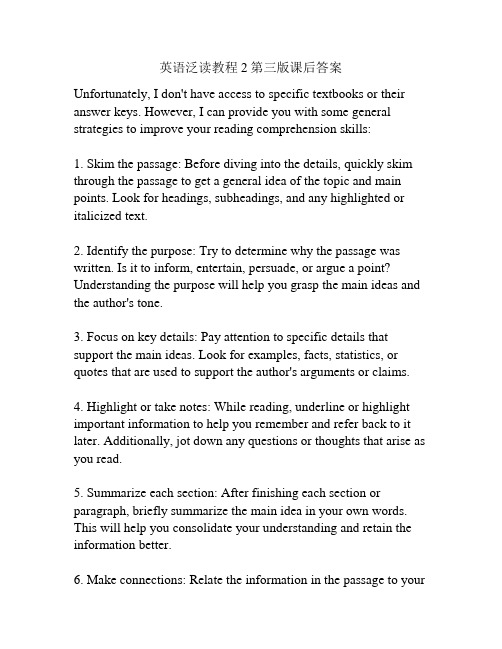《英语泛读教程2》第三版教案
泛读教程3教案

泛读教程3教案教案标题:泛读教程3教案教案目标:1. 帮助学生提高泛读技巧和阅读理解能力;2. 培养学生的阅读兴趣和阅读习惯;3. 培养学生的自主学习和合作学习能力。
教学重点:1. 培养学生的泛读技巧;2. 培养学生的阅读理解能力。
教学难点:1. 提高学生的阅读速度和准确性;2. 培养学生的阅读思维和分析能力。
教学准备:1. 泛读教程3教材;2. 多媒体设备;3. 学生练习册;4. 阅读理解练习题。
教学过程:一、导入(5分钟)1. 创造一个愉快的学习氛围,引起学生的注意;2. 提问学生对泛读的理解和经验。
二、预习(10分钟)1. 让学生在课前预习教材中的文章标题和段落标题;2. 学生扫读文章,了解文章大意。
三、阅读与讨论(20分钟)1. 学生独立阅读教材中的一篇文章;2. 学生小组内讨论文章的主题、中心思想和关键细节;3. 学生展示自己的理解和观点。
四、泛读练习(15分钟)1. 学生进行泛读练习,尽量提高阅读速度和准确性;2. 引导学生使用快速阅读技巧,如扫读、略读和跳读。
五、阅读理解(15分钟)1. 学生独立完成阅读理解练习题;2. 学生交流答案并进行讨论;3. 教师给予指导和解释。
六、巩固与拓展(10分钟)1. 学生根据自己的理解和感受,写下对本课内容的总结;2. 学生分享自己的总结,并相互评价。
七、作业布置(5分钟)1. 布置阅读任务,要求学生阅读下一篇文章;2. 布置练习题,要求学生完成阅读理解练习。
教学反思:1. 教师应及时给予学生反馈,鼓励他们的努力和进步;2. 教师要关注学生的阅读兴趣和阅读习惯,适时调整教学策略;3. 教师要鼓励学生进行合作学习,促进彼此之间的互动和学习成长。
以上是一个关于泛读教程3的教案示例,希望对您有所帮助。
根据实际情况,您可以根据教学目标和学生的实际情况进行适当的调整和修改。
大学英语精读第三版第二册教案_Unit3

■
第五页,编辑于星期五:二十点 五十分。
Before Reading
Global Reading
Detailed Reading
Some famous places of interest in London
1. Big Ben
2. Tower Bridge 3. The Tower of London
After Reading
第四页,编辑于星期五:二十点 五十分。
Before Reading
Global Reading
Detailed Reading
After Reading
London is the capital and largest city of the United Kingdom. The city covers 1,580 sq km and
■
第八页,编辑于星期五:二十点 五十分。
Before Reading
Global Reading
Detailed Reading
3. The Tower of London
The Tower of London, located on the northern bank of the Thames River, was built around 1078. It was used alternately as a fortress, royal residence, and state prison in its early years. Today, it is maintained as an arsenal with a garrison, and is open to the public. The well-preserved Norman and medieval structures cover nearly 7.2 hectares (18 acres).
大学英语精读第三版第二册unit2教案

一、教学目标1. 理解课文内容,掌握课文中的重点词汇和语法知识。
2. 培养学生阅读理解和分析的能力。
3. 提高学生的口语表达能力,让学生能够运用所学知识进行简单的口语交流。
4. 培养学生的写作能力,让学生能够根据课文内容写出一篇完整的短文。
二、教学内容1. 课文内容:本文主要讲述了一位年轻人在面对生活困境时,通过坚持努力,最终实现了自己的梦想。
2. 重点词汇:determination、difficulties、opportunity、achieve、inspire 等。
3. 语法知识:现在完成时、条件状语从句等。
三、教学步骤1. 导入新课(1)展示图片,让学生根据图片内容进行简短的口语交流,引入话题。
(2)简要介绍课文背景,激发学生的学习兴趣。
2. 阅读课文(1)学生自读课文,理解课文大意。
(2)教师引导学生分析课文结构,总结课文内容。
(3)讲解重点词汇和语法知识,让学生进行跟读和练习。
3. 口语练习(1)分组讨论,让学生运用课文中的词汇和语法知识进行口语交流。
(2)教师挑选几组进行展示,给予点评和指导。
4. 写作练习(1)教师布置写作任务,要求学生根据课文内容写一篇短文。
(2)学生独立完成写作任务。
(3)教师批改作文,给予点评和指导。
5. 课堂小结(1)回顾本节课所学内容,强调重点词汇和语法知识。
(2)布置课后作业,巩固所学知识。
四、教学评价1. 课堂表现:观察学生在课堂上的参与度、口语表达能力和写作水平。
2. 课后作业:检查学生的作业完成情况,了解学生对本节课内容的掌握程度。
3. 课堂测试:通过课堂测试,评估学生对本节课重点词汇和语法知识的掌握情况。
五、教学反思本节课通过阅读、口语和写作等多种形式,让学生在轻松愉快的氛围中学习英语。
在教学过程中,教师应注重激发学生的学习兴趣,培养学生的阅读理解、口语表达和写作能力。
同时,教师应关注学生的个体差异,给予学生充分的关注和指导,提高学生的学习效果。
现代大学英语 精读2(第三版)教学课件B2U8

现代大学英语精读2(第三版)教学课件B2U8明确教学目标,指导研究内容和教学方式本课件介绍了《现代大学英语精读2(第三版)教学课件B2U8》的具体内容和主题。
该课件主要包括以下内容:课程概述:简要介绍了本章所涵盖的主题和重点内容。
阅读材料:提供了一篇与主题相关的英文文章,用于学生的阅读训练。
词汇研究:列出了一些与文章内容相关的重要词汇,并提供了词义解释和例句。
阅读理解:包括了多个与文章相关的问题,旨在帮助学生理解和分析文章中的信息。
课堂讨论:提供了一些讨论问题,可用于课堂上的互动和学生之间的交流。
拓展阅读:列出了一些额外的阅读材料,供学生进一步拓展知识。
总结与复:对本课内容进行总结,并提供一些复建议。
通过研究《现代大学英语精读2(第三版)教学课件B2U8》,学生可以提高阅读能力,扩展词汇量,并深入了解与主题相关的知识。
本文档旨在探讨适合《现代大学英语精读2(第三版)》教材的教学方法,并包括以下内容:多媒体教学:通过利用多媒体资源,如投影仪、音频和视频材料,可以增加学生的参与度和互动性,提高他们的英语阅读能力。
教师可以结合文本内容,展示相关的图片、图表和视频片段,以帮助学生更好地理解和记忆。
讨论活动:通过组织小组讨论或全班讨论,可以促进学生之间的交流和合作。
教师可以提出问题,引导学生思考并发表自己的观点。
这不仅可以提高学生的口语表达能力,还可以培养他们的批判思维和分析能力。
案例分析:选取与教材相关的案例进行分析和讨论。
通过分析实际案例,学生可以将所学知识应用到实际情境中,提高他们的综合运用能力。
练与评估:在教学过程中,教师可以设计各种练和评估活动。
例如,阅读理解题、写作练、小组演讲等。
这些活动可以帮助学生巩固所学知识,并检验他们的研究成果。
通过采用上述教学方法,可以增强学生对《现代大学英语精读2(第三版)》教材的理解和应用能力,提高他们的研究效果和兴趣。
通过采用上述教学方法,可以增强学生对《现代大学英语精读2(第三版)》教材的理解和应用能力,提高他们的学习效果和兴趣。
新视野大学英语读写教程第三版book2unit7教案讲稿

Book 2 Unit 7 Women: Making a difference todayUnit 7 Text AWoman at the management level女性管理者(1st ---2nd class-hour)I. Pre-reading Activities:Warm-up questions (15 M)What’s the respective role your father and mother in your family?What’s your opinion of the tradi tional family roles/division?How would you perceive the women’s role at the management level in the future?Words & Expressions checkup (30M)Check if the students have mastered the new words, which are required to be previewed before class.New Words1. flourish: To develop quickly and be successful; to grow well近义词thrive, bloom 繁荣,兴隆;茂盛•Few businesses are flourishing in the present economic climate.•These plants flourish in a damp climate.•He is alive and flourishing. 他还活着,并且混得不错。
2. harness: If you harness something such a natural source of energy, you bring it under your control and use it•利用(自然能源)•Techniques harnessing the energy of the sun are being developed •马具•To harness a horse ( to put a harness on a horse , to attacha horse or other animal)3. hierarchy:A system of organization in which people or thins have different ranks or positions depending on how important they are. •They became very conscious of the lack of females in the hierarchy.•Create, establish ~•Military~ 军衔制4. plausible:Apparently reasonable and valid, and truthful =reasonable•:Such a theory seems very plausible.• A plausible answer•Be, seem, sound ~ 可信,好像有理,听起来有理•Find/judge/think sth. plausible 认为…似乎有理•Barely, hardly~ 几乎没有道理•Extremely, highly, terribly~ 非常可信5. diplomatic: Means relating to diplomacy and diplomats 外交;Be able to say or do things without offending people 有交际手腕的•The secretary is diplomatic on the telephone.•We are looking for a peaceful, diplomatic solution. •Diplomat 外交官•Foreign diplomat 外国外交官•Senior diplomat资深外交官★diplomatically: ad.讲究手腕地;灵活变通地;外交地You can say it diplomatically and with love by telling your kids the reasons why you had to cancel the plan for a party.你可以灵活她、满怀爱心地告诉你的孩子为什么你不得不取消聚会计划。
大学英语精读第三版第二册教案

大学英语精读第三版第二册教案教案标题:大学英语精读第三版第二册教案教学目标:1. 帮助学生提高大学英语阅读能力,包括理解文章主旨、理解文章细节、推理推断等。
2. 培养学生的词汇积累能力,扩大学生的词汇量。
3. 培养学生的阅读策略,提高学生的阅读速度和理解能力。
教学重点:1. 学会运用阅读策略,如预测、扫读、略读等,提高阅读效率。
2. 掌握文章主旨及细节的理解技巧。
3. 培养学生的词汇积累能力,扩大学生的词汇量。
教学难点:1. 培养学生的阅读策略,使其能够在有限时间内快速获取文章信息。
2. 帮助学生理解并运用文章中的高级词汇和语法结构。
教学准备:1. 大学英语精读第三版第二册教材及相关教辅资料。
2. 多媒体设备和投影仪。
3. 复印教材相关文章和练习题。
教学过程:一、导入(5分钟)1. 利用多媒体设备播放与本课相关的图片或视频,激发学生对话题的兴趣。
2. 引导学生回忆上一课时的内容,过渡到本课的学习。
二、预习导入(10分钟)1. 让学生自主阅读课文标题、段落标题和图片等,预测文章内容。
2. 鼓励学生提出问题并讨论,激发学生的思考和好奇心。
三、阅读训练(30分钟)1. 分段教学,引导学生通过扫读和略读等阅读策略快速获取文章主旨和细节信息。
2. 针对每个段落的重点句子和难点词汇进行解读和讲解。
3. 组织学生进行小组讨论,分享对文章的理解和感受。
四、词汇拓展(15分钟)1. 教师呈现并讲解本课文章中的重点词汇和短语。
2. 组织学生进行词汇拓展活动,如词义辨析、词汇运用等。
五、语法点讲解(10分钟)1. 教师讲解本课文章中的重点语法结构,并与学生一起进行练习。
2. 引导学生在阅读中注意语法结构的运用和理解。
六、练习与巩固(15分钟)1. 分发练习题,让学生进行阅读理解和语法填空等练习。
2. 引导学生相互检查答案,并进行讲解和讨论。
七、总结与反思(5分钟)1. 教师对本课的教学进行总结,强调重点和难点。
2. 鼓励学生提出问题和反思,促进学生对学习的思考和反思。
大学英语泛读教程2(第三版)Reading Master 2_Final Exam B

A. VocabularyDirections: Choose the correct phrasal verb to compete the sentences. Each is used only one time.1. The winner of the singing contest ______ to collect her prize on the stage.2. At our annual meeting very few people ______ any new ideas.3. The skydivers ______ the plane one by one to avoid any accidents.4. My dad ______ drinking because his doctor told him he needed to be in better shape.5. I was going to try jumping off the high diving board at our swimming pool but ______ at the last second.6. Batman ______ his attackers by fighting them with his acrobatic skills.7. The archaeologists ______ what they believed to be the ancient remains of an unknown king. Directions: Choose a word from the box to complete the sentences below. Each is used only one time.8. My dream about my dog was so ______ I could almost smell his fur.9. ______ drinking is considered to be very bad for one’s health.10. The ______ of most fables is that they teach us some sort of moral at the end of each story.11. Mars is said to be ______ because of its harsh environment.12. According to the ______ of this meeting, we first need to discuss how to cut costs.13. The circus performer completed the ______ of placing his head in a lion’s mouth.14. The surgeon mentioned that the operation, while ______, was not impossible.15. In the1980s, there was a dance ______ called the chicken dance which everyone loved.B. Grammar16. This juice is too sweet so it should be ______.a. water downb. watered downc. watering downd. waters down17. Indian curry is a little ______ spicy for my taste and I try to avoid it.a. sob. suchc. tood. enough18. My roommate’s dirty laundry was ______ our apartment so I washed it for her.a. stink upb. stinks upc. stunk upd. stinking up19. When I was a teenager I had major ______ with my favorite singer so I collected all hispictures.a. obsessionb. obsessc. obsessesd. obsessing20. It is ______ good day today for a picnic.a. quiteb. reasonablec. absolutelyd. a rather21. The car show this year was so ______ unimpressive that I went home early.a. utterb. utterancec. utterlyd. uttering22. The storm was so ______ powerful that many people were without electricity for days.a. littleb. reasonablyc. wonderfullyd. devastatingly23. ______ I graduate from university I have to start looking for a serious job.a. Whileb. As soonc. Onced. Until24. I can’t drive a motorcycle _______ I have passed the driving examination.a. whenb. untilc. whiled. by the time25. ______ that the job was much too stressful for her, Celia decided to quit.a. Feelb. Feelsc. Feltd. Feeling26. ______ had a successful 20-year career in law, Mr. Brown retired.a. Haveb. Hasc. Havingd. Been27. Although video games are ______ for teenagers, many adults still enjoy playing them.a. intendb. intendsc. intendedd. intending28. The memory stick ______ into place on the left side of my laptop.a. clickb. clicksc. clickedd. clicking Directions: Change the sentences to their reduced relative clauses by crossing out the unnecessary words.29. The dolphins that are being fed right now were born at this aquarium.30. Anyone who is interested in joining the soccer club should come to the meeting this afternoon.C. Reading Comprehension(A)Directions: Read the excerpt from Parkour: The Spirit of Freedom in Unit 8 of the textbook and answer the questions that follow.31. Which statement would David Belle likely agree with?a. There’s too much competition in sports.b. There’s not enough competition in sports.c. Sports are all boring.d. Sports should be played freely and in teams.32. Which of these statements is not true about Raymond Belle?a. He was in the military.b. He was disillusioned about sports.c. He developed his own training.d. He was influenced by others.33. According to the passage, why did Raymond Belle have to depend on himself?a. He had to take care of his son alone.b. He had many fights in the army.c. He was abandoned by his parents.d. All of the above.34. Which of these exercises would Belle least likely do?a. stretchingb. walkingc. weight liftingd. sit-ups35. Which of the following closest in meaning to the word intrigued?a. interestedb. preparedc. pioneeredd. includedDirections: Read the excerpt from Hard Core: How to Work Your Essential Muscles in Unit 10 of the textbook and answer the questions that follow.36. According to the passage, which is not included in your core muscles?a. abdominalsb. hipsc. chestd. neck37. Why does the writer mention that a gym membership is not needed?a. Core muscle exercises don’t require equipment.b. Core muscle exercises don’t require indoor space.c. Memberships are too expensive.d. Memberships are not available.38. According to the passage, what does exercising your core muscles help with?a. increased appetiteb. good stancec. weight lossd. better flexibility39. What does the writer offer as a challenge when planking?a. lift a handb. arch your backc. lift a footd. hold the position for 10 seconds40. Which of the following is closest in meaning to the word version?a. postureb. corec. positiond. variationDirections: Read the excerpt from Underrated Cities in Unit 11 of the textbook and answer the questions that follow.41. According to the passage, what was Nara once known for?a. Being bigger than Kyotob. Being safec. Being traditionald. Being a capital city42. According to the passage, what is one advantage of Nara over Kyoto?a. There are more traditional hotels.b. There are fewer crowds.c. You can get a glass of sake.d. It is closer to Tokyo.43. According to the passage, when did Montenegro come into existence?a. in 1166b. in 2006c. 130 years agod. No one knows.44. According to the passage, what is unique about Kotor?a. It is close to Dubrovnik.b. It is a medieval town.c. It is a World Heritage Site.d. All of the above.45. Which of the following is closest in meaning to the word enchanting?a. deservingb. toweringc. beautifuld. raucousDirections: Read the excerpt from Wish You Were Here in the Review 4 section of the textbook and answer the questions that follow.46. According to the writer, where will he or she be when you read this e-mail message?a. on a beachb. on a busc. in Haputaled. in a small town47. What can we infer about the weather in Sri Lanka?a. It varies from each location.b. It is hot everywhere.c. It is cold only in winter.d. It is dry in the mountains.48. Why did the writer miss the train to Haputale?a. He stayed out late the night before.b. His alarm clock didn’t work.c. The train schedule was wrong.d. He went to the wrong station.49. What did the writer try on the train ride?a. fresh waterb. some candyc. his own provisionsd. a drink50. Which of the following is closest in meaning to scorching?a. a little warmb. somewhat hotc. hotd. extremely hot。
英语泛读教程2第三版课后答案

英语泛读教程2第三版课后答案Unfortunately, I don't have access to specific textbooks or their answer keys. However, I can provide you with some general strategies to improve your reading comprehension skills:1. Skim the passage: Before diving into the details, quickly skim through the passage to get a general idea of the topic and main points. Look for headings, subheadings, and any highlighted or italicized text.2. Identify the purpose: Try to determine why the passage was written. Is it to inform, entertain, persuade, or argue a point? Understanding the purpose will help you grasp the main ideas and the author's tone.3. Focus on key details: Pay attention to specific details that support the main ideas. Look for examples, facts, statistics, or quotes that are used to support the author's arguments or claims.4. Highlight or take notes: While reading, underline or highlight important information to help you remember and refer back to it later. Additionally, jot down any questions or thoughts that arise as you read.5. Summarize each section: After finishing each section or paragraph, briefly summarize the main idea in your own words. This will help you consolidate your understanding and retain the information better.6. Make connections: Relate the information in the passage to yourown experiences, prior knowledge, or other readings you have done. Connecting new information to existing knowledge can enhance comprehension.7. Practice active reading: Engage with the text by asking questions, making predictions, and forming opinions as you read. This will keep you actively involved and help you understand the material more deeply.Remember that effective reading comprehension takes practice and patience. Regularly challenge yourself with a variety of texts from different genres to improve your overall reading skills.。
- 1、下载文档前请自行甄别文档内容的完整性,平台不提供额外的编辑、内容补充、找答案等附加服务。
- 2、"仅部分预览"的文档,不可在线预览部分如存在完整性等问题,可反馈申请退款(可完整预览的文档不适用该条件!)。
- 3、如文档侵犯您的权益,请联系客服反馈,我们会尽快为您处理(人工客服工作时间:9:00-18:30)。
《英语泛读教程2》第三版教案
《英语泛读教程2》第三版教案。
第一单元 Life's First Feelings。
1.教学目标。
教学重点:
1.掌握本单元重点词汇和短语。
2.能熟练地运用句型及语言结构。
教学难点:
1.能够使用句型及语言结构描述婴儿的行为表现。
2.能够理解并展现婴儿与外界环境产生的情感交流。
2.教学方法。
本单元教学以讲授和听力、口语练习为主,课堂互动和讨论为辅助。
3.教学过程。
Step 1. Pre-reading。
让学生带着以下问题阅读文章:
1. What is the author going to talk about in this article?
2. What do babies need in order to be happy?
3. What are some things that babies do when they are unhappy?
Step 2. Reading。
请学生阅读本单元的文章,并回答课堂中的问题。
可以分组讨论,最
后让代表发表意见。
Step 3. Vocabulary。
教师呈现本单元生词列表,并与学生交流词义、用途及其他相关信息。
对于不同的生词可以使用不同类型的课件进行解释。
Step 4. Pronunciation。
教师可以通过模仿婴儿的语调和表情,给学生呈现一段短语音和发音
方面的示范,以帮助学生更好地理解和掌握语音。
Step 5. Grammar。
在阅读文章后,教师可以对文章中的句子进行练习和理解。
